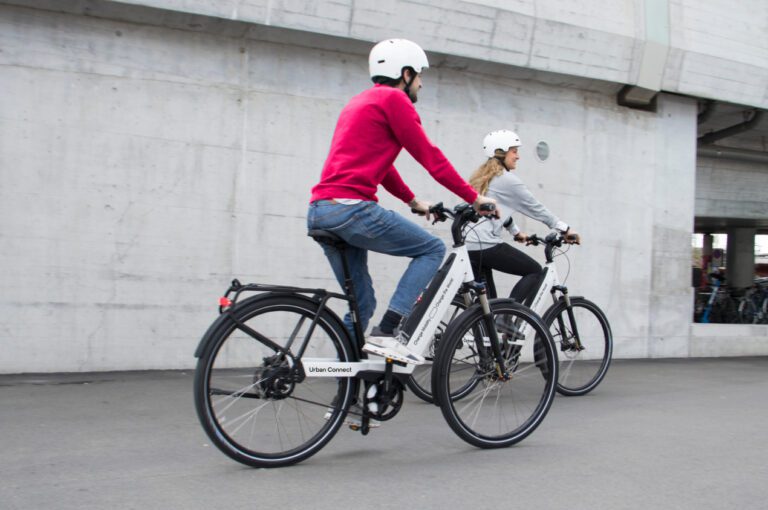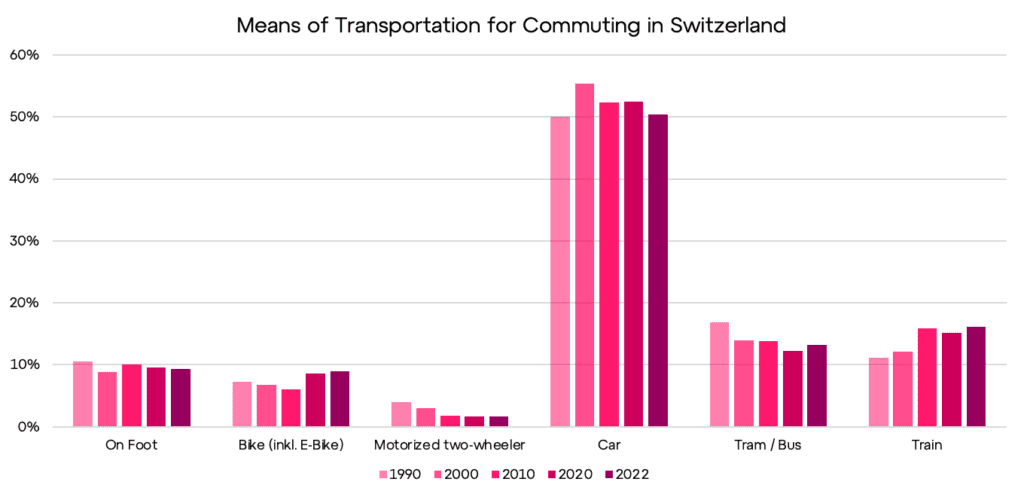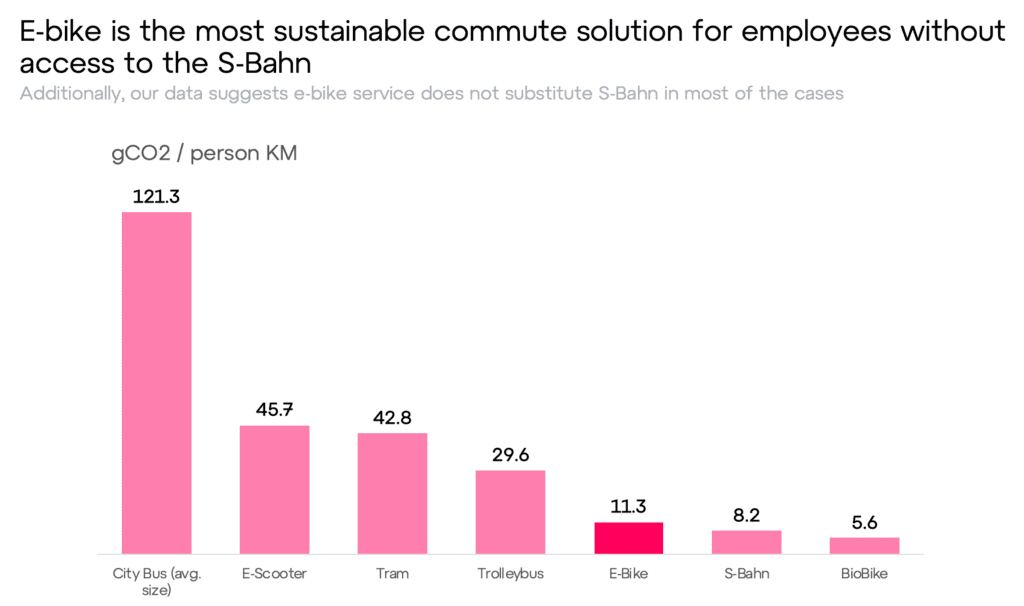News
Whitepapers
Bike-to-Work Challenge: Improve Employee Health and Increase Corporate Benefit
May 13, 2024
Whitepapers

Switzerland’s largest corporate campaign to promote cycling is underway again. In the months of May and June, over 3’000 companies and 100’000 employees engage in a fun competition to promote employee health and low-carbon mobility at the same time.
The campaign is more relevant than ever. Auto traffic congestion in Switzerland continues to remain the highest form of transport for commuting, with over 50% of daily trips being made by car, versus less than 10% for (e-)bikes (see Chart 1). In fact, even for ultra short distances between 1-5 km, 44% of people still preferred to get into their cars rather than use any other alternative. This invites the question of how companies can promote low-carbon mobility options like (e-)biking.

Chart 1: Dominant car usage crowds out other transport modes in Switzerland
Benefits of offering employees access to a corporate e-bike fleet
One easy way for companies to promote low-emission commuting is to offer employees easy access to a corporate e-bike fleet. Such an initiative offers companies multiple benefits, including:
A way to cut emissions: e-bikes represent a low-carbon way to commute in Switzerland, with only S-Bahn travel and bio-bikes representing lower emissions (Chart 2). For many service-oriented companies where their employee mobility makes up a large portion of the firm’s carbon footprint, an e-bike fleet can make a big difference in reducing emissions. In fact, our data shows that for 58% of the e-bike users, e-bikes substitute tram or bus, which is up to 90% more CO2-friendly, and for 11% it even substitutes a car ride.

Chart 2: E-bike is one of the most sustainable commuting options
Reduction in car traffic: giving employees easy access to a fleet of premium e-bikes typically leads to a lower reliance on short car trips, resulting in smoother traffic flows and quicker commutes. Many users state that using e-bikes saves a lot of time and adds flexibility to their commute.
Improving employee health and wellness: giving employees access to an (e-)bike fleet can have positive effects on employee health and well-being. In fact, research has shown that even small increases in exercise levels – like testing an e-bike at work – can have large improvements in health levels for typically unactive people. This article describes how offering employees access to e-bikes can lead to better physical health, improved cognitive function, and generally improved well-being.
Attracting and retaining top talent: offering innovative perks like access to a premium e-bike fleet can make a company more attractive to prospective employees. Additionally, such benefits can contribute to employee retention by fostering a positive work environment and demonstrating the company’s commitment to employee well-being and low-carbon mobility options.
Employees also benefit from having easy access to an e-bike fleet
Given these strong reasons for companies to consider making an e-bike fleet available to employees, another key consideration relates to the benefits for employees. These include some of the following:
Cost Savings: having access to a corporate, shared e-bike fleet means that employees do not have to buy an e-bike (which can cost over CHF 5’000), but instead borrow a corporate vehicle when it is needed for little to no cost to them.
Mental wellbeing: e-biking outdoors can have multiple mental health benefits. For example, it can help reduce stress, anxiety, and depression, while improving cognitive functionality and an overall sense of well-being. Indeed, the combination of physical activity, fresh air, and being in nature can have a positive impact on mental health. Our users state that commuting by e-bike adds fun to their trips and gives them a chance to exercise and spend more time outdoors instead of being in overcrowded busses.
Time savings: for distances between 5-10 km, e-biking can be the fastest mode of transport, due to the ability to bypass traffic jams, route flexibly, and because their use does not require waiting for public transport connections or parking hassles. Our users highlight this as one of the most important advantages for using an e-bike on their daily commute. And with the rising popularity of faster e-bikes like the Stromer (i.e. 45km/h), e-biking becomes an increasingly viable alternative to taking the car for longer commutes beyond 10 km.
Benefiting from the convenience of mobility-as-a-service: since corporate e-bike fleets are typically managed as a service (including maintenance), employees always get access to state-of-the-art technology and frequently maintained e-bike fleets. This means that they do not have to worry about “taking the bike to the shop” but instead always get access to premium bikes in a great state.
The Path Forward
Given the benefits for both companies and employees, the corporate e-bike sharing service seems to be set for growth – especially in the wake of the bike-to-work challenge. In fact, many of the world’s most innovative companies like Lonza, Roche, Google already offer e-bike fleets to their employees. In this way, companies not only invest in their employees, but also position themselves as employers-of-choice, working to accelerate the shift to a low-carbon economy.
If you are interested in learning more about offering your employees a corporate e-bike fleet, feel free to book a demo here and we would be excited to share more information with you.
Change Mobility – Change the World